Extradition Today: Implementation Problems
- Authors: Klemin A.V.1, Goncharova N.N.1, Denisovich V.V.2
-
Affiliations:
- Kazan Innovative University named after V.G. Timiryasov
- Chelyabinsk State University
- Issue: Vol 18, No 6 (2022)
- Pages: 150-154
- Section: Articles
- URL: https://journal-vniispk.ru/2541-8025/article/view/147306
- ID: 147306
Cite item
Abstract
About the authors
Andrey V. Klemin
Kazan Innovative University named after V.G. Timiryasov
Email: klemin@ieml.ru
Dr. Sci. (Law), Professor, Head of the Department of International and European Law Kazan, Russian Federation
Natalia N. Goncharova
Kazan Innovative University named after V.G. Timiryasov
Email: goncharova-nnn@yandex.ru
Cand. Sci. (Law), Associate Professor, Associate Professor of the Department of International and European Law Kazan, Russian Federation
Veronika V. Denisovich
Chelyabinsk State University
Email: ltybctyejv1984@yandex.ru
Cand. Sci. (Law), Associate Professor of the Department of Criminal Law and Criminology Chelyabinsk, Russian Federation
References
- Alieva M.N., Temirsultanova N.T. Problems of the implementation of the institute of extradition in international and national law // Law and Law. 2019. No. 2. pp. 116-119.
- Valeev R.M. Extradition of criminals in modern international law (Some issues of theory and practice). Kazan, 1976. -pp. 19-65.
- Goncharova N.N. Problems of conducting criminal procedural actions with the participation of foreign citizens on the Russian territory, as well as in the buildings of embassies and consulates of Russia / N.N. Goncharova, E.Y. Latypova, N.A. Goncharov // Gaps in Russian legislation. 2021. Vol. 14. No. 4. pp. 366-372.
- Goncharova N.N. Implementation of international norms and standards in the air legislation of Russia in the context of the ratio of international and Russian law / N.N. Goncharova // International public and private law. 2018. No. 6. pp. 26-29.
- Kayumova A.R. Criminal jurisdiction in international law: issues of theory and practice: dissertation... Doctor of Law: 12.00.10 / Kayumova A.R. Kazan, 2016. -448 p.
- Koshkina D.A. Modern trends in the development and improvement of the judicial procedure for the extradition of persons who have committed crimes of a terrorist nature through its unification // Journal of Foreign Legislation and Comparative Jurisprudence. 2017. No. 2. p. 2.
- Latypova E.Y. The principle of equality and the principle of humanism and their features in criminal law // In the collection: The Constitution of the Russian Federation and the development of the legal system of the state: general theoretical and sectoral aspects. Materials of the International Scientific and Practical Conference (Kazan, 30.10.2018). -Kazan: Publishing House «Fatherland», 2019. -pp. 341-346.
- Latypova E.Yu., Nechaeva E.V. Controversial issues of the content of the principle of humanism in criminal law // Bulletin of the Kazan Law Institute of the Ministry of Internal Affairs of Russia. 2019. No. 3 (37). pp. 355-360.
- Purgina O.V. Extradition-grounds and procedure for its implementation // Migration law. 2009. No. 4. pp. 5-7.
- Reshetneva T.V. Extradition of persons for criminal prosecution in the context of the humanistic foundations of criminal procedure and international legal regulation // Bulletin of the Udmurt University. 2018. No. 4. p. 26.
Supplementary files








